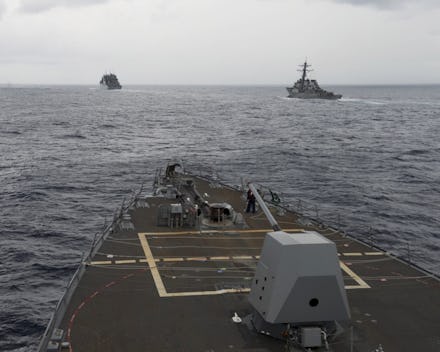Chinese navy seizes US naval drone in South China Sea

Reuters is reporting that the Chinese navy has seized a United States unmanned underwater drone in the South China Sea.
Citing an anonymous U.S. defense official, Reuters reports the seizure took place on Dec. 15 just as U.S. oceanographic survey ship USNS Bowditch was about to retrieve the vessel. CNN reports the Bowditch had stopped to retrieve two underwater drones when a Chinese naval ship shadowing the Bowditch put a small boat into the water that took the U.S. drone. The U.S. then told the Chinese over the radio that the drone was American property, but received no response from the Chinese, only an acknowledgment that they had received the message.
"The UUV was lawfully conducting a military survey in the waters of the South China Sea," said the defense official, Reuters reports. It's a sovereign immune vessel, clearly marked in English not to be removed from the water – that it was U.S. property."
The seizure was confirmed by Pentagon spokesman Jeff Davis in a news conference, who said that the Pentagon was taking the incident seriously.
"It is ours, and it is clearly marked as ours and we would like it back," Sessions said. "And we would like this not to happen again."
"This is not the sort of conduct we expect from professional navies," said Davis, The New York Times reports.
The underwater vessel was measuring ocean conditions, including water salinity, temperature and clarity, Reuters reports, and it is unclear what the motivation for its seizure would be. According to the Times, officials are still in the process of determining whether the incident was a low-level action undertaken by Chinese sailors or a more strategic operation orchestrated by senior Chinese leaders.
"This move, if accurately reported, is highly escalatory," Mira Rapp-Hooper, a senior fellow in the Asia-Pacific Security Program at the Center for a New American Security, told Reuters, "and it is hard to see how Beijing will justify it legally."
This situation — which, Reuters notes, is the first of its kind in recent memory — comes just two weeks after Trump sparked concern from the Chinese when he spoke on the phone with Taiwan President Tsai Ing-wen, testing the longstanding "One-China policy" that has marked U.S. diplomatic relations with the Asian superpower.
Nov. 10, 2015, 2:26 p.m.: This story has been updated.